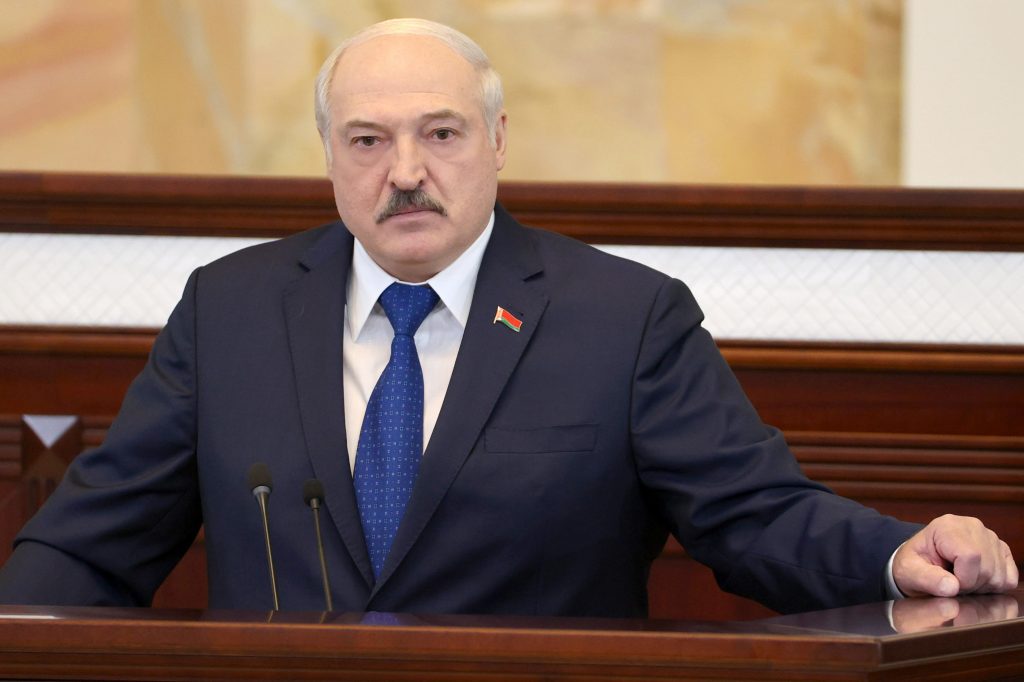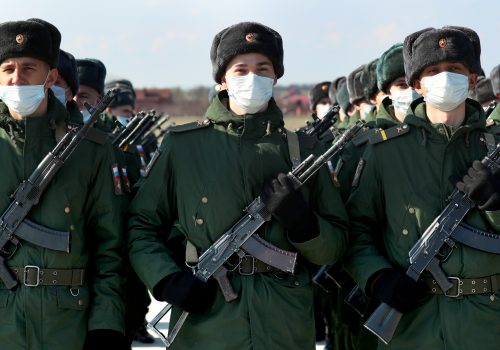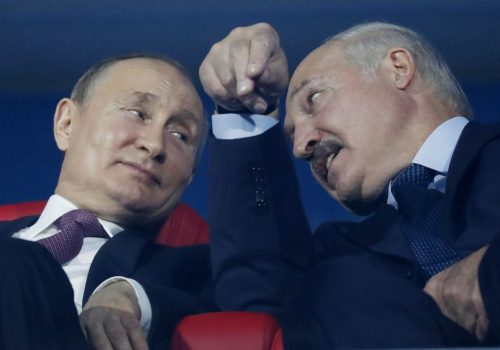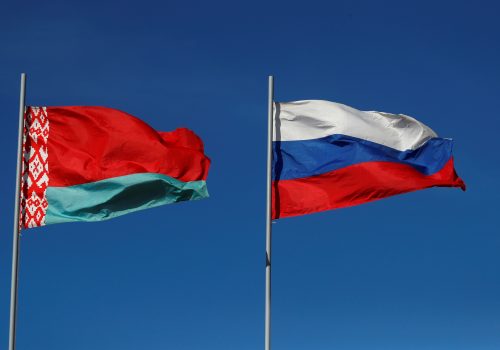It has been called an act of state-sponsored air piracy, a hijacking, and a kidnapping. It has led European leaders to order EU-based airlines to stop flying over Belarusian airspace and to ban Belarusian carriers from flying over EU airspace or using its airports. It has isolated Belarus like never before. And it will almost certainly spark a new round of US and EU sanctions against the country.
But serious questions remain about whether the authoritarian regime of Alyaksandr Lukashenka acted alone in forcing Ryanair Flight 4978 to land in Minsk, where Belarusian authorities arrested dissident journalist Raman Pratasevich, who was living in exile in Lithuania, and his Russian girlfriend Sofia Sapega. More specifically, did Lukashenka get a stealthy assist from Vladimir Putin’s Russia in hijacking a commercial airliner travelling between two European Union countries? Was the Putin-Lukashenka axis of autocrats acting in concert in this brazen act of air piracy? And if so, what are the implications for Western policy?
UK Foreign Secretary Dominic Raab said he found it “very difficult to believe that this kind of action could have been taken without at least the acquiescence of the authorities in Moscow.” Kremlin spokesman Dmitry Peskov dismissed Raab’s comment as “obsessive Russophobia.”
At this point, much of the suspicion about Moscow’s potential involvement is circumstantial. The Russian and Belarusian air defense systems are deeply integrated, as are their militaries and security services, making it hard for many to believe that the Putin regime would not have, at the very least, knowledge of the operation.
A confidential unpublished report by the Minsk-based Center for Strategic and Foreign Policy Studies, which is known for having excellent sources in the Belarusian and Russian elites, suggested that Moscow’s involvement was likely more extensive and more active. According to the report: “It is obvious that Belarusian special services…do not have the resources to monitor the movements of even the leading opposition figures abroad, to conduct external surveillance abroad, and to coordinate the work of Belarusian services inside the country accordingly. Therefore, the involvement of Russian special services at all stages of the operation to apprehend Pratasevich is beyond doubt.”
There is also the curious case of the three unidentified individuals aboard the flight who remained in Minsk after the forced landing rather than flying on to Vilnius. Initial unconfirmed reports indicated that they were Russian citizens. One of those reports came from the influential Telegram channel VChK-OGPU, which has more than 160,000 subscribers and claims to “reveal the secrets of officials, oligarchs, gangsters, and security officials.” In a post on May 23, the channel claimed that its sources said some of those who deplaned in Minsk were Russian operatives who were assisting, and carrying the credentials of, the Belarusian KGB. “They were the main organizers of this operation, but they let their colleagues from Belarus take the glory.”
Likewise, Russian opposition politician Ilya Yashin posted on Twitter: “It looks like this was a joint operation by the FSB and the Belarusian KGB.”
But The New York Times cited Lithuanian officials as saying one of the unidentified passengers who disembarked in Minsk was a Greek citizen and the other two were Belarusian nationals, adding that “uncertainty about their identities raised questions over whether they had any role in the operation.”
The official Russian reaction and that of pro-Kremlin media outlets, which all seemed to be armed with ready-made talking points to justify and support Belarus, also raised suspicions. Russian Foreign Ministry spokeswoman Maria Zakharova called the West’s reaction “shocking.” She also quickly played the whataboutism card, raising a 2013 incident in which Bolivian President Evo Morales’s plane was forced to land in Austria because of suspicions that American fugitive Edward Snowden was on board, as justification for Belarus’s actions. Russian Foreign Minister Sergei Lavrov called Belarus’s handling of the incident “reasonable.”
Eurasia Center events

The crisis appears to advance Moscow’s goal of increasing Belarusian isolation from the West and its dependence on Russia. It also seems certain to foreclose once and for all any attempt by Lukashenka to return to his pre-August 2020 game of tacking between Moscow and the West in order to achieve the maximum degree of geopolitical flexibility.
“There are certain tactical benefits for Moscow from this crisis as it makes Lukashenka more dependent on Russia,” Andrei Kortunov, head of the Kremlin-founded Russian International Affairs Council, told Bloomberg.
The incident was not the first time Russia gained such a “tactical benefit” in recent weeks. The international crisis over Ryanair Flight 4978 and the arrests of Pratasevich and Sapega came just over a month after Russia’s Federal Security Service arrested two Belarusians, including one with US citizenship, and accused them of plotting to carry out a coup against Lukashenka during the May 9 Victory Day parade in Minsk. Those arrests and coup plot allegations also appeared to be designed to advance Russia’s strategic goals of isolating Lukashenka and increasing his dependence on Moscow.
The crisis comes just weeks before US President Joe Biden will meet Putin in Geneva on June 16. And while the evidence of Russian involvement is mostly circumstantial at this point, it is getting the attention of Western officials.
In remarks reported by the Financial TImes, German Chancellor Angela Merkel said, “When I talk to the Russian President, this issue will certainly be on the agenda. But we cannot now indulge in speculation. That there is a close relationship between Belarus and Russia, that is known. But as I said, no confirmed findings.”
Radosław Sikorski, a member of the European Parliament who has served as Poland’s Foreign and Defense Minister, wrote on Twitter that if it turns out Moscow was involved, then “Russian personnel and Russian assets should also be sanctioned.”
Whether or not Russia was directly involved in this act of state-sponsored air piracy and kidnapping, as Lukashenka’s main international benefactor, the Kremlin bears a large degree of responsibility for his actions. I have argued repeatedly in this space that sanctions against the Lukashenka regime should also target his Russian enablers. The hijacking of Ryanair Flight 4978 and the kidnapping of Raman Pratasevich only reinforces that it is time to impose crippling costs on the Putin-Lukashenka axis of autocrats.
Brian Whitmore is a Nonresident Senior Fellow at The Atlantic Council’s Eurasia Center, an Adjunct Assistant Professor at The University of Texas at Arlington, and host of The Power Vertical Podcast.
Further reading
The views expressed in UkraineAlert are solely those of the authors and do not necessarily reflect the views of the Atlantic Council, its staff, or its supporters.

The Eurasia Center’s mission is to enhance transatlantic cooperation in promoting stability, democratic values, and prosperity in Eurasia, from Eastern Europe and Turkey in the West to the Caucasus, Russia, and Central Asia in the East.
Follow us on social media
and support our work
Image: Belarus President Alyaksandr Lukashenka pictured on May 26 as the fallout from the recent "air piracy" incident continued. (Sergei Sheleg/BelTA/TASS via REUTERS)




